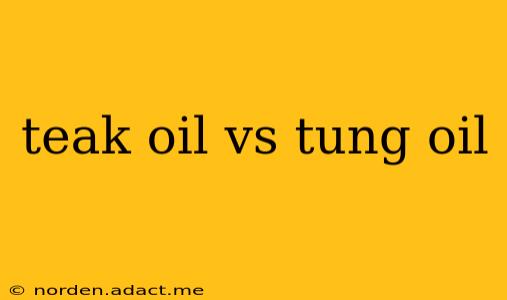Choosing the right oil finish for your wood project can be daunting. Two popular choices often top the list: teak oil and tung oil. While both offer protective and aesthetic benefits, understanding their key differences is crucial for making the best selection. This comprehensive guide will delve into the specifics of teak oil versus tung oil, helping you determine which is the ideal option for your needs.
What is Teak Oil?
Teak oil isn't actually derived from teak trees, as many believe. Instead, it's typically a blend of mineral oil, linseed oil, and sometimes other additives like solvents and UV inhibitors. The name "teak oil" is a bit of a misnomer, reflecting its historical use in treating teak wood, renowned for its natural weather resistance. This blend is designed to penetrate wood, offering some protection against moisture and UV damage. However, it's important to note that the level of protection varies significantly depending on the specific formulation.
What is Tung Oil?
Tung oil, on the other hand, is a true drying oil extracted from the nuts of the tung tree. Unlike teak oil, it polymerizes (hardens) when exposed to air, creating a durable, water-resistant film on the wood's surface. This film offers superior protection compared to teak oil blends, providing a more substantial barrier against moisture and UV rays. However, true tung oil requires more coats and longer drying times to achieve a complete finish.
Teak Oil vs. Tung Oil: Key Differences
| Feature | Teak Oil | Tung Oil |
|---|---|---|
| Composition | Blend of mineral oil, linseed oil, etc. | 100% oil extracted from tung tree nuts |
| Drying Time | Relatively fast | Significantly slower, multiple coats needed |
| Durability | Moderate | High |
| Water Resistance | Moderate | High |
| UV Protection | Moderate (depends on additives) | Good |
| Penetration | Good | Good, but forms a surface film |
| Cost | Generally less expensive | Generally more expensive |
| Ease of Application | Easier | Requires more skill and patience |
What Type of Wood are They Best Suited For?
Both teak oil and tung oil can be used on various types of wood, but their properties make them better suited for different applications. Teak oil is often chosen for outdoor furniture or projects needing quicker drying times, but it may require more frequent reapplication. Tung oil, with its superior protection, is ideal for high-end furniture, fine woodworking, and projects requiring maximum durability and water resistance.
Which is better for outdoor use?
While both can be used outdoors, tung oil's superior water resistance and UV protection make it a better long-term choice for exterior applications. However, regular maintenance is still needed for both.
Which is better for indoor use?
For indoor use, either oil can work well. The choice often comes down to the desired level of protection and the look you want to achieve. Tung oil offers a more durable and lustrous finish, while teak oil may provide a slightly more natural look.
How often should I reapply teak oil or tung oil?
Reapplication frequency depends on factors like exposure to the elements, usage, and the specific product used. Teak oil might require reapplication every few months for outdoor projects, while tung oil might last much longer between applications.
Are there any health concerns to consider?
Always use appropriate ventilation when working with either teak oil or tung oil. Some formulations may contain solvents that could be harmful if inhaled. Read and follow the manufacturer's safety instructions carefully.
Conclusion
The choice between teak oil and tung oil ultimately depends on your specific needs and project requirements. Consider factors like the desired level of protection, drying time, budget, and the type of wood you're working with. Weighing the pros and cons outlined above will help you make an informed decision and achieve the best possible results for your woodworking project. Remember to always research specific product formulations before starting your project, as the composition and properties can vary significantly between brands.
